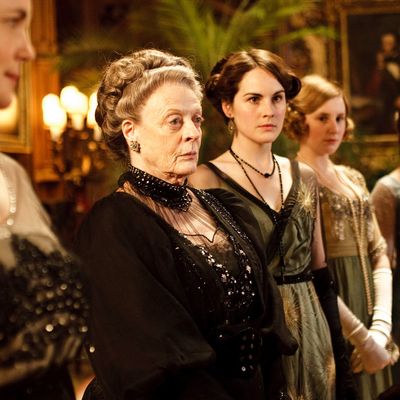
The New York Review of Books has carved out a nice little niche for itself by going highbrow on (relatively) highbrow television. First there was Daniel MendelsohnÔÇÖs Mad Men takedown, then Lorrie MooreÔÇÖs paen to Friday Night Lights, and now we get British poet James Fenton going in on Downton Abbey. (To be fair, Fenton seems to have more affection for the series than his headline writer did. Headline: ÔÇ£The Abbey That Jumped the Shark.ÔÇØ) While MendelsohnÔÇÖs well-considered, argumentative piece on Mad Men was much better and more serious than the two that have followed (not that we didnÔÇÖt love reading MooreÔÇÖs thoughts on Tim Riggins, believe us), weÔÇÖre always down to analyze a literary takedown of a TV show we love. So, please, join us as we break down FentonÔÇÖs case against Downton.
WeÔÇÖre going to do this in the order that they come in the essay.
1. Downton Abbey is not gay enough. Writing about Bates, who youÔÇÖll recall fought with Lord Grantham in the Boer War before he was hired as his valet, Fenton points out:
This business, by the way, of officers giving employment to their batmen, their personal military servants, in later civilian lifethis is or was a well-known cover for homosexual attachments. One went into the army and formed a passionate liaison with a man from another class. The war over, one brought the batman home, under pretext of valeting requirements. And while we have as yet (at the end of the second season, with a third already promised) no proof of any impropriety in the relationship between Bates and the earlno eve-of-battle indiscretion on the veldt, no cuddles on the High Karoononetheless we ought to treat with suspicion the bare story that, in some unspecified way, Bates saved the earls life in what was referred to as the African War At the end of season two we leave [Bates] in prison, sentenced to hang, reprieved, ready for his appeal. A gay back-story could well prove the scriptwriters nuclear option.
2. Downton Abbey is supposed to be in the North of England, but itÔÇÖs so obviously filmed in the South.
ÔÇ£But not every visual aspect corresponds to historical reality. The story is set in North Yorkshire, but filmed in the south of England, and nothing we see on screen reminds one at all of the north. The inconceivably grand house is Highclere Castle in Hampshire, built in the nineteenth century by the architect of the House of Commons, an essay in ÔÇ£JacobethanÔÇØ (eclectic Italianate) style. The parish church is Bampton in Oxfordshire, and obviously built in Cotswold stone. The locations are used sparingly. For instance, we see park but no flower gardenÔÇöLady Mary refuses to show it to a visitor, in the aftermath of the death of Mr. Pamuk.
3. Edith wouldnÔÇÖt have sent that letter to the Turkish ambassador.
ÔÇ£The more one thinks about this letter, the less likely it seems that a conventional-minded young woman in her position would have dreamed of writing it, let alone signing it.
4. The heir with the burned face and the amnesia was one plot twist too many. (We at Vulture are on the record as agreeing with this, but we donÔÇÖt know if the guy suggesting Bates and Lord Grantham start a love affair should be so irked by it.)
Of course the fact that his head is swathed in bandages and anyway disfigured makes it impossible for those who knew the supposedly drowned youth, let alone the viewer, to come to any judgment at all on the evidence presented. It seems a cynical and desperate piece of plot-weaving, all too redolent of the lowest of the low soap operas. It trifles with our sympathies even as it exploits our horror at disfigurement. But what can one do? The Abbey has jumped the shark, and we are still left waiting to see how it all turns out. ItÔÇÖs not the end, but it is the beginning of the end, a reminder of how easy we are to fool. Great television? Good fun, without a doubt. ItÔÇÖs a large sentimental contraption, coming at us, as the first trains came at us in the early Age of Steam, with a man in front, waving a red flag as if to say: you have been warned.
So, there you have it, a fairly enjoyable ÔÇ£essayÔÇØ about Downton Abbey that doesnÔÇÖt get anywhere near the real, thorny issue about the series, which is why despite its very real problems┬áÔÇö with the melodrama, the pacing, and even the characterization┬áÔÇö no one cares at all. (Including us!) Seriously, has there ever been a series that has gotten this much of a pass from this many people? The Guardian ran a post when the show aired in England titled ÔÇ£Downton Abbey: you are awful ÔǪ but I like you,ÔÇØ which sums it up perfectly. Never have so many brains turned their critical capacity over to their hearts. It probably has something to do with all those period dresses and Mary Crawley.

